The effects of physiological body nutrition during cancer treatment.
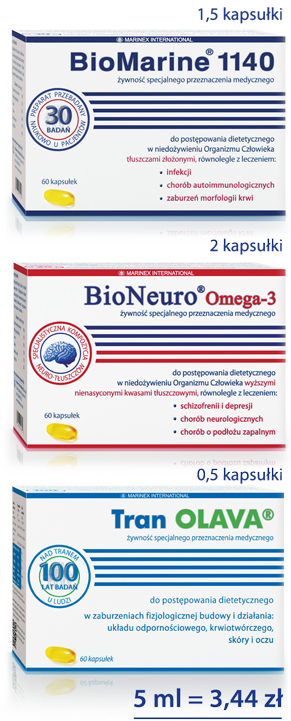
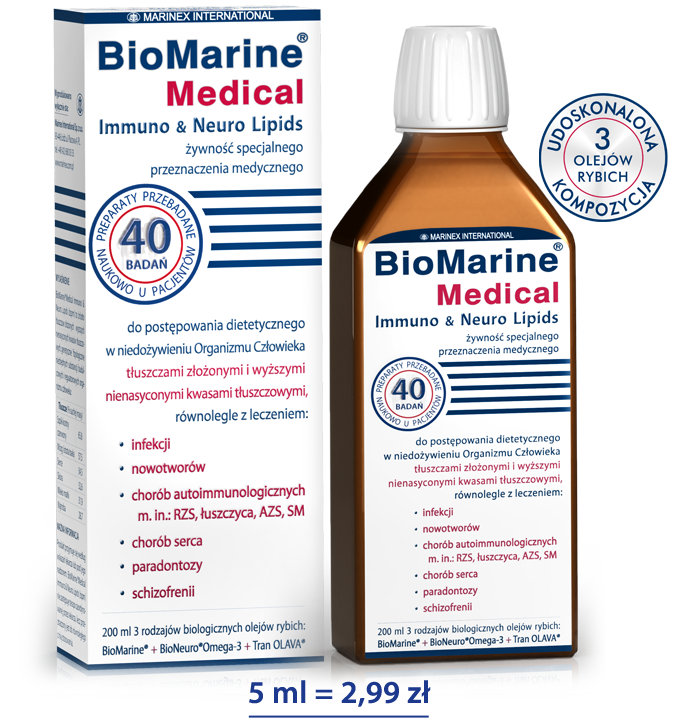
→
IL-2 activity ↑ by 316%,
IL-10 activity ↓ by 45%
– regulation of cytokine levels (proteins that control the processes of growth, maturation, and differentiation of cells involved in immune reactions and hematopoietic processes);
→
NK cell activity ↑ by 67%,
neutrophil activity ↑ by 47% activation of immune cells – of the fighting force of the immune cells against viruses, bacteria, fungi and cancer;
→
interferon-γ production ↑ by 64% (IFN-γ, a cytokine with antiviral activity);
tumour necrosis factor-α production ↑ by 26% (TNF-α, a cytokine produced by macrophages, associated with an inflammatory reaction and affecting apoptotic processes);
→
↑ in the production of platelet activating factor (PAF), which maintains physiological body defence readiness;
→
activation of the physiological processes of haematopoiesis by affecting stem cells, reduced leukopenia and thrombocytopenia;
→
activation of cancer cell destruction mechanisms: inhibition of C protein kinase activity necessary for the multiplication of tumour cells and production of delta-12-prostaglandin J3 activating the p53 gene (coding for a protein involved in the regulation of many cellular processes, in particular activation of DNA repair mechanisms or induction of apoptosis in response to DNA damage).
All results show percentage changes to a given parameter after 4 weeks of taking the product compared to the results obtained before supplementation
BioMarine®Medical – see the nutritional recommendations for cancer patients
We are proud to provide oncological patients with key information for their health. Based on observing lung cancer patients, an official nutritional recommendation for cancer patients was developed.
This recommendation was developed by a Team of Hospital Dietitians, researchers working on this study directly with patients.
The nutritional method recommended by specialists based on the results of patients participating in the study will radically change the lives of all cancer patients.
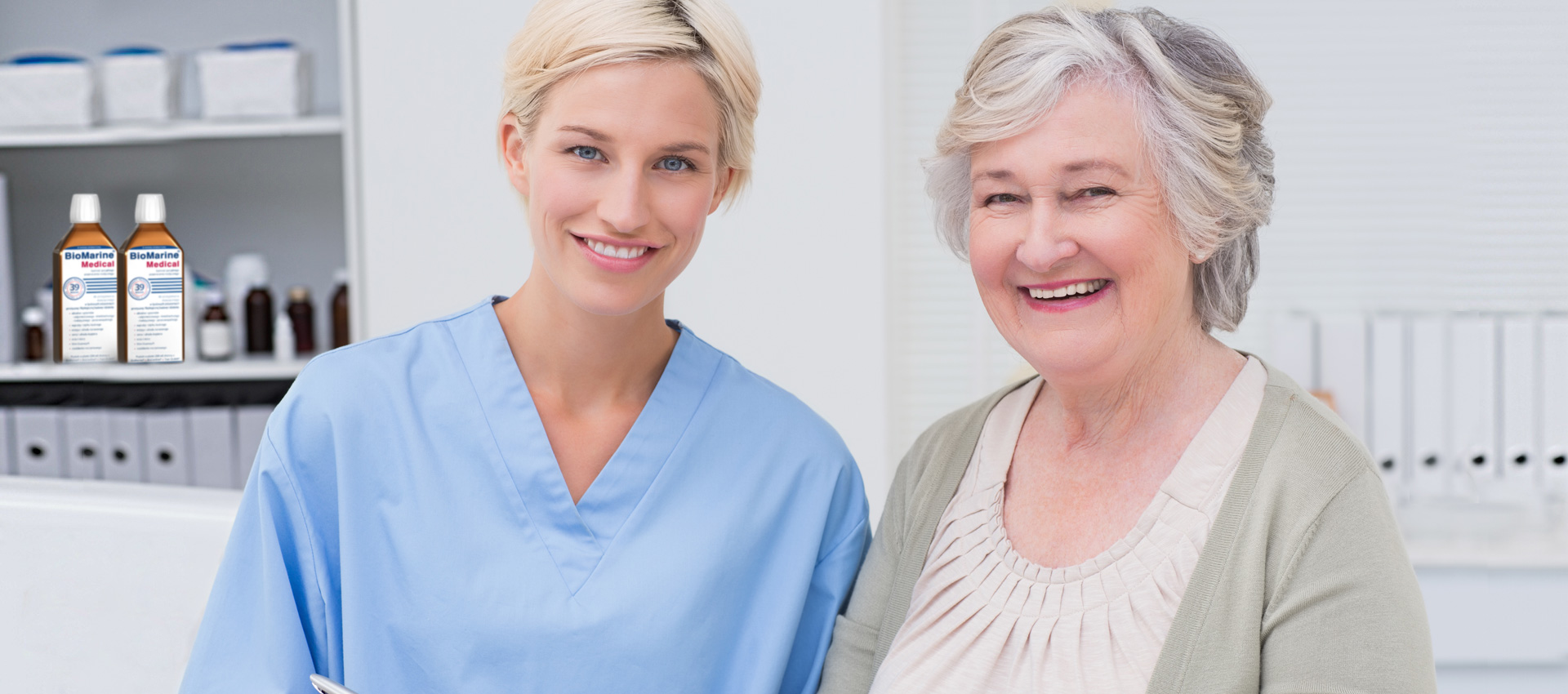
Test results of the FIGHTING FORCE of the immune system fed for 30 days with BioMarine®
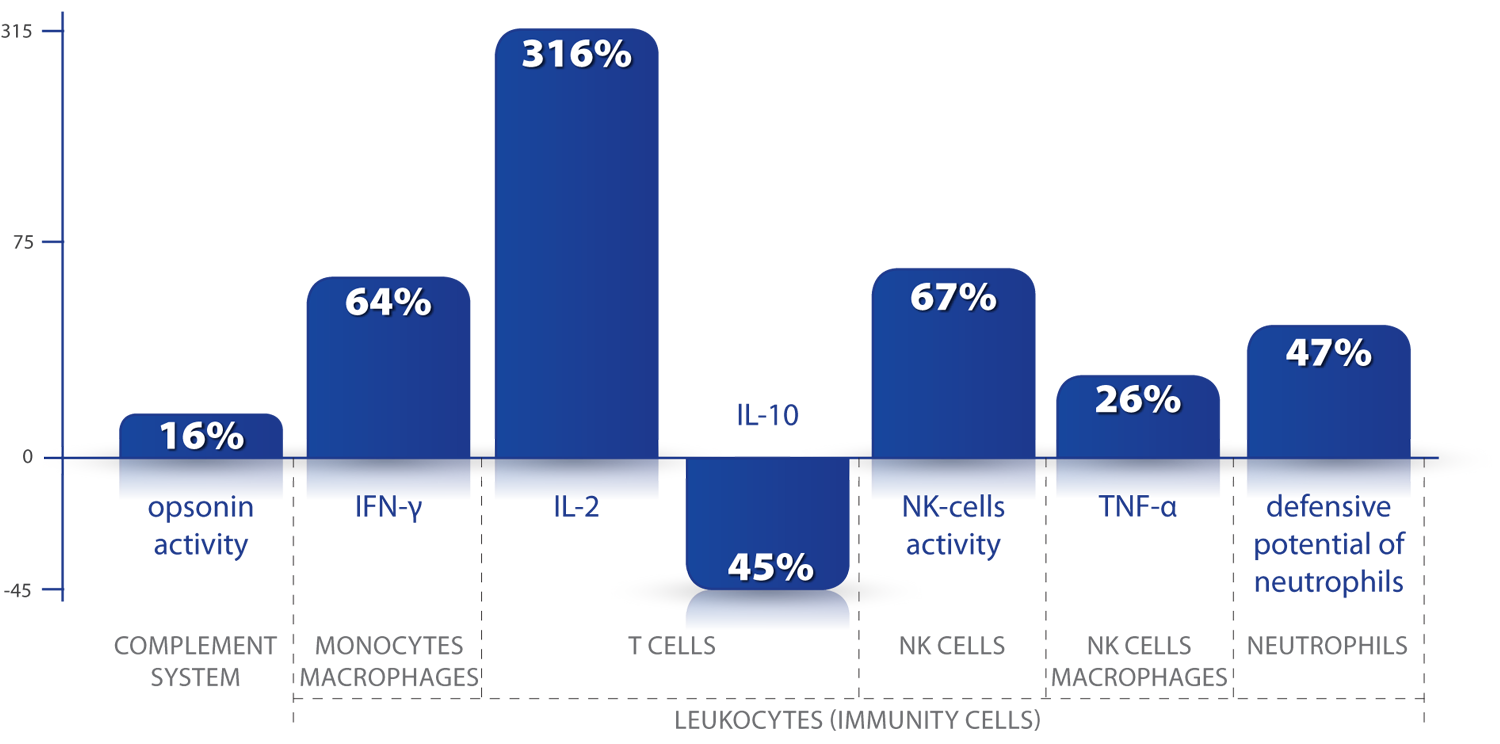
Lewkowicz P., Banasik M., Głowacka E., Lewkowicz N., Tchórzewski H. Modyfikujący wpływ dużych dawek preparatu oleju z wątroby rekina na polaryzację limfocytów T i funkcję neutrofilii krwi; Pol. Merk .Lek., 2005 XVIII,108, 686-692.
Taking 30 capsules (6 capsules 5 times a day) of BioMarine®570 for a month (this corresponds to 60 ml of BioMarine®Medical in terms of the content of squalene and alkylglycerols) a significant increase in the body’s natural and acquired immunity was obtained. There was an improvement in the neutrophil fighting potential by increasing the release of reactive oxygen species and phagocytosis in response to E. coli by 47%, increasing NK cell activity by 67% and opsonin, including components of the complement system (classic route) by 16%. In addition, BioMarine® strongly affects the polarization of CD4 helper lymphocytes for releasing Th1-type and pro-inflammatory cytokines, such as TNF-α (by 26%), IFN-γ (64%) and IL-2 (316%), and inhibits the release of anti-inflammatory IL -10 (45%). This profile enhances the activity of CD8 cytotoxic cells and points to the polarization of virgin cells towards Th1. The body’s defence against oxidative damage increased by 20% (plasma antioxidant capacity increased).
How was this caused?
The body’s response to BioMarine®. The body rebuilt its structures and significantly increased the differentiation of stem cells in the bone marrow, which resulted in the increased production of, among others, T cells, B cells, NK cells, macrophages and neutrophils, as well as increased their reactivity towards the pathogen.
Properly built immune cells create a positive relationship between IL-2/IL-10 cytokine production, i.e. an increase in IL-2 is accompanied by a decrease in IL-10. The increase in IL-2 pro-inflammatory cytokine secretion fully mobilises the immune system. This leads to a significant increase in lymphocyte activity in the search for pathogens. Finding a danger site, they secrete interferon (IFN-γ) directly into pathogenic cells, inhibiting their reproduction.
Physiologically activated macrophages and neutrophils eliminate pathogens. The increase in TNF-α production triggers a cascade of reactions leading to the death of damaged cells in the body. Regulating cytokines suppressing immune system activity (IL-10) leads to long-term immunity. Such a complex reaction of the immune system is highly efficient in recognising, marking and destroying pathogens, without side effects.
Inflammatory factors in a neoplastic disease
As demonstrated by clinical trials, using fish oils that contain essential fatty acids (EFA) EPA + DHA omega-3 (the physiological building substances of the human body) contributes to the elimination of inflammatory conditions in the body. These substances are used by the body already at the level of regulating the activity of genes, which allows the body to better control the reactions related to the development and cessation of inflammatory conditions.


Czynniki zapalne w chorobie nowotworowej
The study which took place at the II Department and Clinic of Cardiology at the Medical University of Łódź encompassed 31 survivors of myocardial infarction. Along with their standard therapy (amongst others, based on statins), they took 2 capsules of BioMarine®Medical food + 2 capsules of BioCardine®Omega-3 (8 ml of BioMarine®Medical calculated on the squalene and alkylglycerol content) for 52 weeks. The control group included 46 patients after myocardial infarction, using only a drug therapy.
See full description of the study »
Using medical food along with drugs significantly reduces the intensity of the ongoing inflammatory processes in the body, measured by the plasma hsCRP levels, as well as leads to an increase in the coronary performance (MET). In the study group alone the level of hsCRP was successfully decreased below the expected value of 5 mg/l.
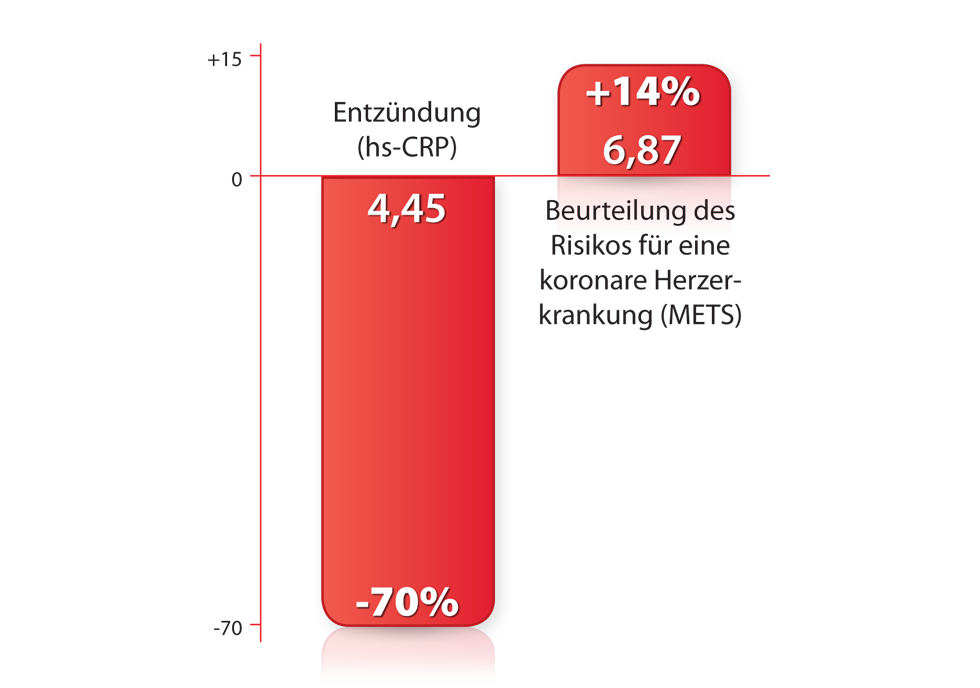
The role of immunological and inflammatory factors in carcinogenesis
The results of latest research are increasingly drawing links between cancer development and chronic inflammatory condition, as well as immunological factors such as cytokines. An inflammatory process creates a microenvironment that fosters the development of cancers. Inflammatory mediators modulate the expression of many genes important for the development of cancer. Moreover, the oxidative stress accompanying inflammation may induce mutagenesis 1.
The immune and hematopoietic systems (bone marrow, the spleen, the liver, lymph nodes) form the defence and regeneration mechanisms of the human body. They produce valuable stem cells which give rise to 100% of immune cells, red blood cells, platelets and pathogen destroyers.
The physiological structure of the immune system determines the effectiveness of the immune mechanisms, which constitute the most powerful protection for the human life and health. However, when out of control, this system may attack its own body. Therefore, the activation of its self-regulation mechanism will determine our health. For this to be possible, it is necessary to supply the physiological building substances, including alkylglycerols, squalene, essential fatty acids (EFA) EPA and DHA omega-3, as well as vitamins A and D3.
The role of immunological and inflammatory factors in carcinogenesis
Efficient functioning of the human body’s anti-inflammatory system is essential in both the prevention and management of cancers. For the body to be able to quickly and effectively eradicate inflammatory conditions, it must be regularly supplied with adequate amounts of substances that make up the anti-inflammatory system.
Such substances are essential fatty acids (EFA)* EPA + DHA omega-3. DHA gives rise to the most potent natural anti-inflammatory substances in the body, namely resolvins, protectins, and maresins, which inhibit the production of pro-inflammatory mediators, thereby creating a microenvironment which is less vulnerable to tumour growth, which may result in reduced proliferation of malignant cells. The transformation of EPA gives rise to resolvins and lipoxins, as well as the slightly pro-inflammatory substances, i.e. series-5 leukotrienes (LTE5, LTB5), series-3 prostaglandins (PGD3, PGE3, PGI3, PGF3) and thromboxane (TXA3). Adequate amounts of essential fatty acids (EFA) EPA + DHA omega-3 lead to the eradication of inflammatory conditions and ensure neuroprotection for the nerve cells.
Cell revitalisation
Adequate amounts of such physiological building and regulatory substances as alkylglycerols, squalene, polyunsaturated fatty acids EPA + DHA omega-3, as well as vitamins A and D3, are necessary for the physiological functioning of the cellular renewal system. The physiological occurrence of regeneration processes is particularly important when the body is devastated by the toxic radio- and chemotherapy treatment.
Conclusions
In the fight against cancer, a physiologically efficient immune system, along with the anti-inflammatory and cell renewal systems, is a cornerstone of efficient medical therapy. While summarising the study conducted with BioMarine®, the scientists concluded: „Not only clinical observations and assessment of the subjects’ immune parameters, but also studies conducted on a group of healthy volunteers may indicate the beneficial effects of the product, which make it possible both to limit the development of neoplasms and to combat cancer”.
A common complication during intensive chemotherapy includes thromboembolic incidents. Chemotherapeutic agents are toxic and have a negative effect on the heart. This may cause myocarditis and pericarditis, leading to the damage of these structures, cardiac arrhythmias and premature ischemic heart disease 2.
Taking into consideration the issues described above, BioMarine® and BioCardine®Omega-3 should be necessarily used as a protective factor in the fight against cancer, thereby ensuring a safe and effective anti-cancer therapy.


Even more spectacular effects can be obtained through comprehensive action
BioMarine®Medical is a unique composition combining the potency of BioMarine®1140, BioCardine®Omega-3 and Tranu OLAVA® cod liver oil.
- Liver oil from deep-sea sharks caught in the Tasman Sea (BioMarine®)
- South Pacific Ocean sardine and anchovy muscle oil (BioCardine®Omega-3)
- Norwegian Sea cod liver oils (Tran OLAVA®)
BioMarine®Medical is also the only source of such a physiological lipid (fat) profile for the human body.
BioMarine®Medical has been created out of concern for our clients who struggle with difficult diseases on a daily basis. Its fluid form is intended to make it possible for them to take the effective dose of building and regulatory substances.


Unique composition of BioMarine®Medical
BioMarine®Medical is a unique nutritional product with such a wide range of indications – for dietary management simultaneously with the treatment of disorders in the physiological structure and function of the immune system, the haematopoietic system, the lymphatic system, the anti-inflammatory system, the liver and the bone marrow, the brain and the nervous system, the heart and the circulatory system, the eyes and the skin, the mucous membranes and the endothelium, as well as their consequences, including infections, cancers, RA, psoriasis, allergies, schizophrenia, and coronary heart disease.
The content of all building and regulatory lipids in BioMarine®Medical 5 ml of the liquid):


Special-purpose medical food should ALWAYS be noted down on a prescription

The immune system, the anti-inflammatory system, the hematopoietic system and the cell renewal system will be fully effective (physiologically) when they receive a scientifically engineered dose of BioMarine®Medical.
Dosage table
Unless your doctor or nutrition specialist recommends otherwise, BioMarine®Medical should be used as follows:
|
In parallel with the treatment of diseases in the acute phase:: cancer, infection, RA, psoriasis, recent stroke and heart attack, schizophrenia and depression, |
FOR ADULTS: |
|
FOR CHILDREN: |
|
|
In parallel with the treatment of diseases in the chronic phase: cancer, RA, psoriasis, schizophrenia and depression, post infections and coronary events |
FOR ADULTS AND CHILDREN: |
|
In parallel with the diagnosis of disorders or diseases of: bone marrow and immune and hematopoietic systems, brain and nervous system, heart and circulatory system and inflammatory diseases |
FOR ADULTS AND CHILDREN: |


Based on the dosage table above, calculate what dose of BioMarine®Medical is currently needed by your body.
BioMarine®Medical should be taken 15-20 minutes before meal – this will ensure optimum absorption of the lipids contained in the product.
The daily dose of the product is usually taken in 2-3 portions. However, if you take greater amounts of BioMarine®Medical, you may divide your daily dose into more portions (even up to 8). An ideal solution is to use the product before each meal.
Fish oil is absorbed already through the oral mucosa. Therefore, before swallowing, it should be kept for a few seconds in the mouth – this way, the mucous membranes undergo direct physiological reconstruction and regeneration.
If the fish aftertaste is hard to accept, you may mix a portion of the oil with natural fruit juice (e.g. raspberry or cherry, but never with citrus fruits), eat is together with bread, or swallow with a small amount of boiled water or herbal tea.
The effectiveness of oncological therapy
The efficiency of the oncological therapy depends on the strength and precise action of the physiological mechanisms of the human body. For the fight against cancer to be effective, it is necessary to activate the most important systems and mechanisms of the human body, i.e. the immune, the circulatory and the antioxidant systems. The daily diet should also provide the body with the physiologically required substances that build and activate these systems.
Where to obtain them from?
Of course, from food. Each medical therapy should be supplemented by appropriate nutrition, as each disease creates a greater than normal demand for the physiological building substances. A diet alone is not enough – it must be supplemented with tested products from the medical food category.
What is medical food?
It is the main, and in numerous cases – the only, source of physiological substances for the human body. A therapy, when combined with medical food, is more effective and safer for the patient, and this is what we all aim for. Only then will the body be strong enough to fight cancer, thereby becoming resistant to the side effects of radio- and chemotherapy.
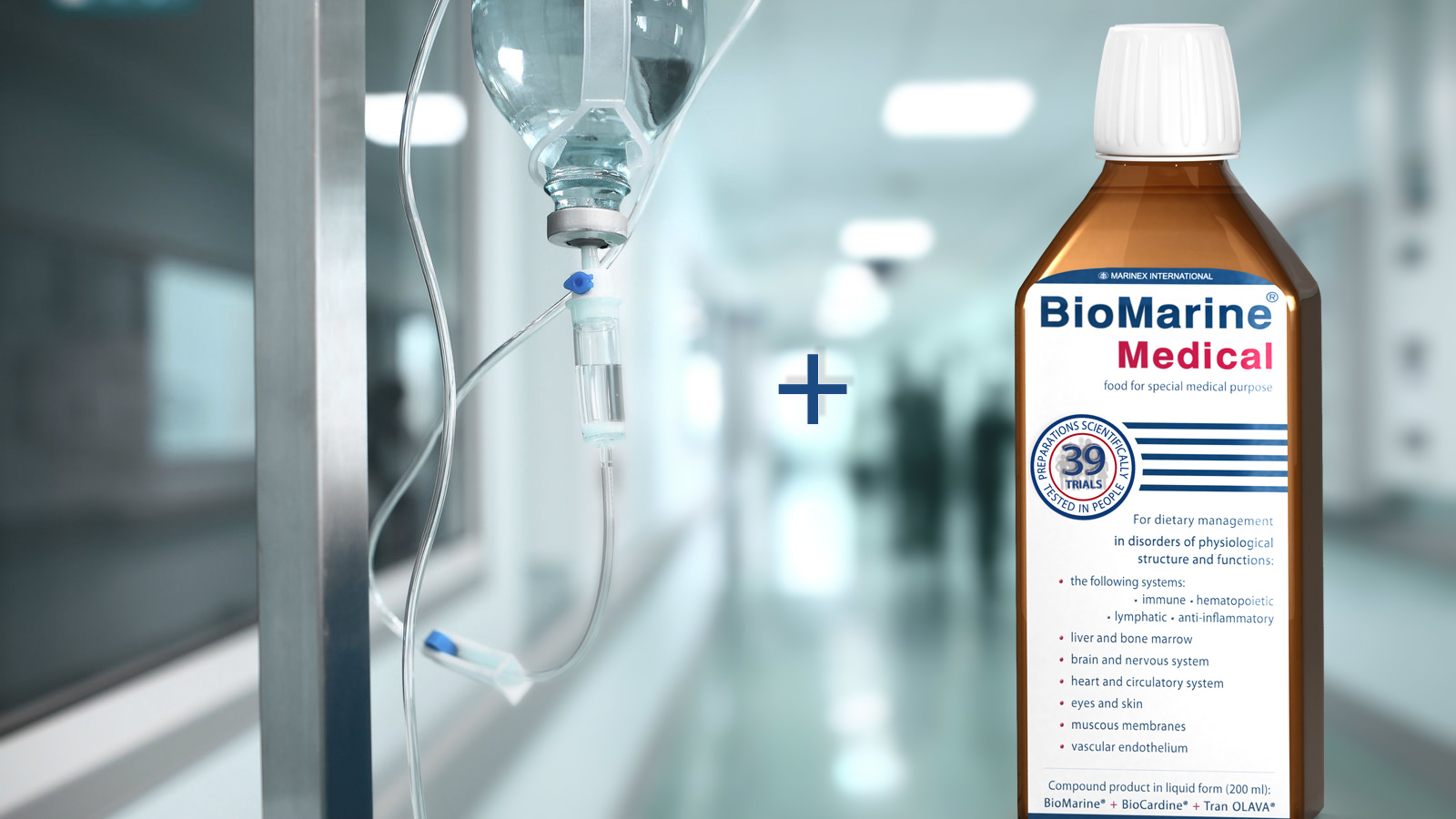
Nutrition in oncology
Research shows that as many as 80% of oncological patients suffer from malnutrition. There are several reasons for that – insufficient oral nutrition due to lack of appetite, tumour location hindering biting or swallowing, numerous diagnostic tests and examination requiring the patient to refrain from eating.
And during the fight against cancer, supplying the body with its physiological substances which it is going to use for activating the basic defence and regeneration processes is particularly important. Medical nutrition not only contributes to significant improvement of the patients’ well-being, but it also supports their therapies by giving them strength to fight against their diseases and protecting their bodies against the negative consequences of such therapies.
An anti-cancer diet must be rich in seafood products (fish and sea fruit) as well as in fruit and vegetables which should be accompanied by healthy oils, such as olive oil, rapeseed oil. However, to provide the body with adequate amounts of substances (especially the building ones), it is necessary to supplement appropriate preparations from the medical food category – the ones which have been clinically tested.
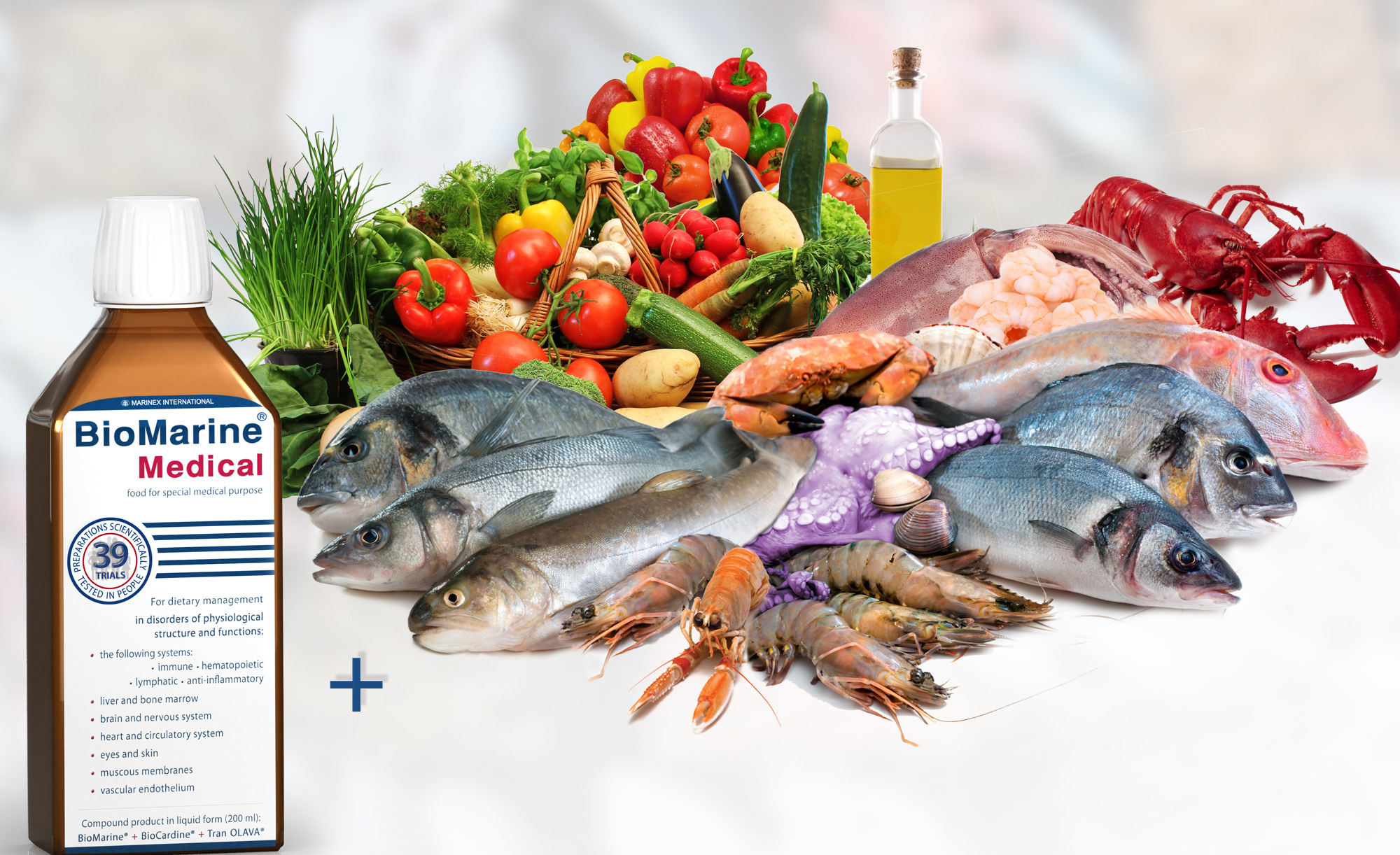
The physiological role of squalene and alkylglycerols in activating the anticancer processes of the body
Scientific evidence confirms the necessity of using alkylglycerols and squalene in the prevention of cancer and during anti-cancer therapy. Used by the body, they provide it with:
Protective action – alkylglycerols have protective properties and reduce the side effects of radiotherapy and radiation damage, as well as extend the survival time. In the case of cervical cancer, they prevent the radiation leukopenia and thrombocytopenia3 as well as reduce the frequency of fistula formation by 47% 4.
Cytotoxic action – alkylglycerols exhibit direct cytotoxic action on cancer cells, inhibit their proliferation by blocking the activity of protein kinase C (PKC), as well as slow down the process of tumour vascularisation 5.
Supporting the effectiveness of chemotherapy – squalene reinforces the toxicity of cytostatic agents: adriamycin, 5-fluorouracil and bleomycin towards cancer cells. On the other hand, it has a protective action, thereby limiting the toxic impact of drugs (cisplatin) on the healthy stem cells of the bone marrow 6,7.
Production and differentiation of the morphotic elements of the blood – the body uses the alkylglycerols delivered to produce PAF. The release of adequate amounts of PAF helps to maintain full activity of the NK cells and macrophages responsible for combating against cancer 5.
Protective action – squalene, thanks to its coating ability, reduces the mutagenicity of many dangerous carcinogens e.g. benzoapyrene, DMBA 6, 7.
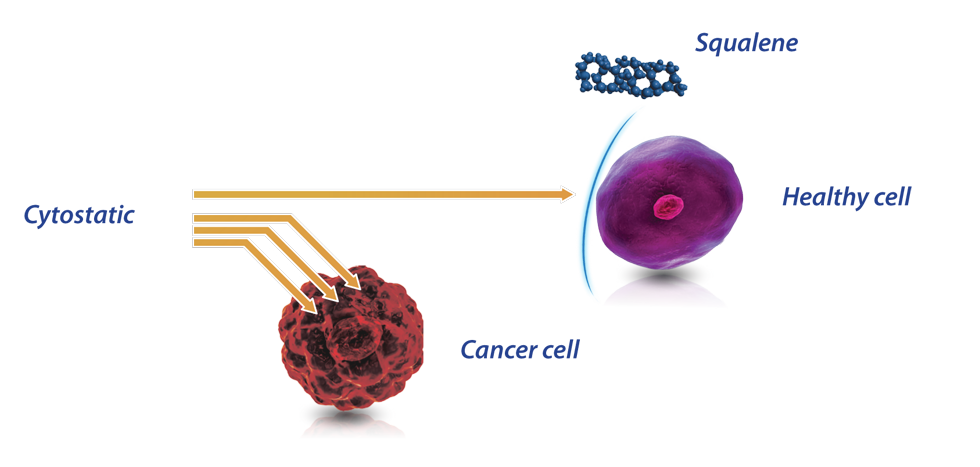
The physiological role of the polyunsaturated fatty acids EPA + DHA omega-3 in activating the anticancer processes of the body
Scientific evidence in genetics and physiology, as well as from the anti-cancer action of the body supplied with polyunsaturated fatty acids EPA + DHA omega-3, indicates the absolute necessity to use adequate amounts of these substances both in prevention and in anti-cancer therapies.
Elimination of inflammation – the body uses the polyunsaturated fatty acids EPA + DHA omega-3 supplied in a diet to produce resolvins and protectins – the unique natural anti-inflammatory substances able, amongst others, to eradicate active inflammatory conditions or limit excessive blood coagulation. As the most powerful inducers of elimination of the inflammatory process, the resolvins and protectins derived from DHA quench the production of pro-inflammatory mediators, thereby creating a microenvironment which is less vulnerable to tumour growth, which may result in reduced proliferation of malignant cells 8,9. Using 1.6 g of EPA + 0.7 g of DHA for 5 days in patients with sepsis lead to significant reduction in the pro-inflammatory IL-6 levels (over 50%) 10.
Apoptosis of cancer cells – besides resolvins and protectins, the body cells with polyunsaturated fatty acids* EPA omega-3 also produce a compound known as delta-12-prostaglandin J3. This substance is extremely valuable because it has the potential to destroy cancer cells. It was proved that the high anti-cancer effectiveness of this unique substance stems from its capacity to act on the genes, especially to activate the important p53 gene in cancer cells. It is the activation of this gene that initiates the process of apoptosis in these cells, thereby leading to their self-destruction 8,9.
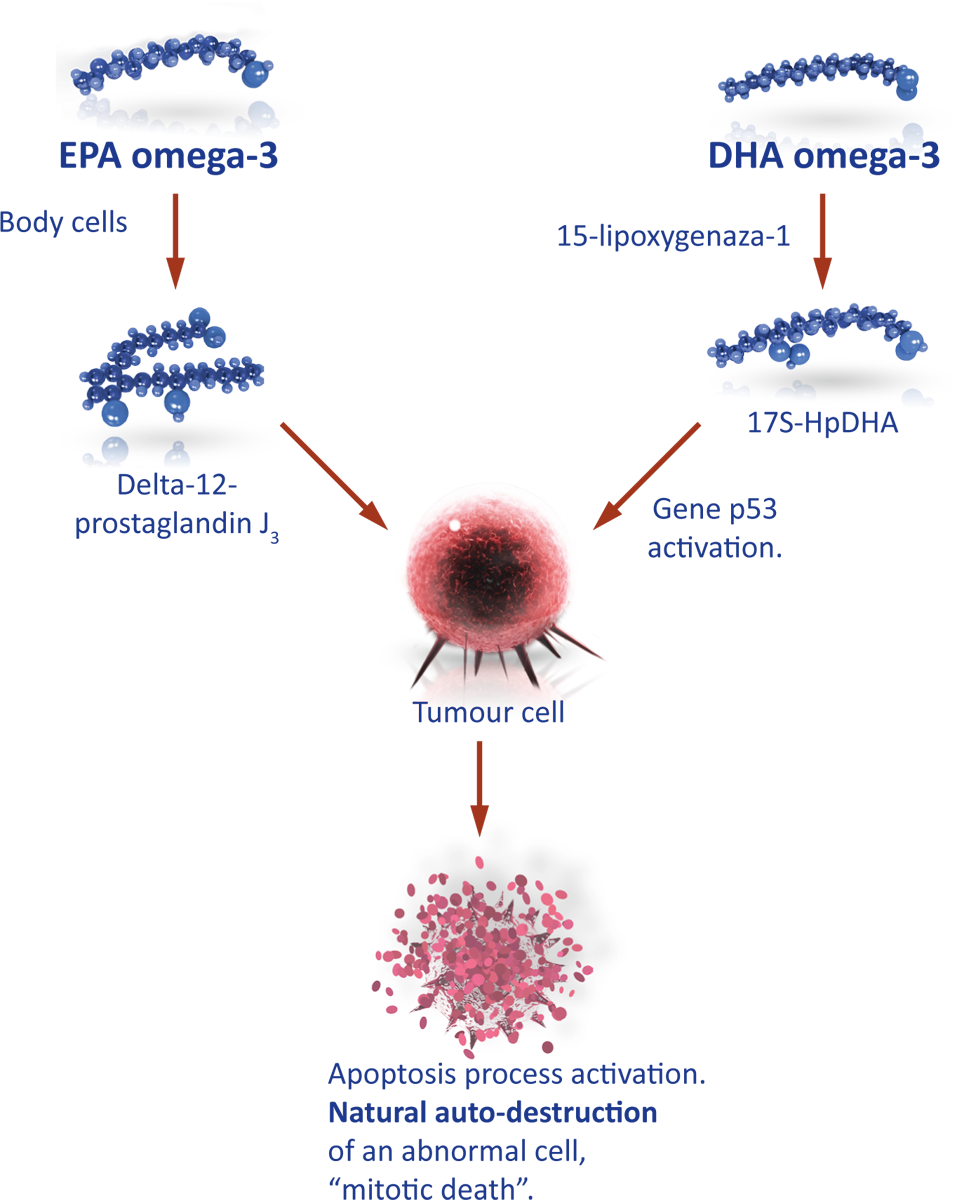
The physiological role of the polyunsaturated fatty acids EPA + DHA omega-3 in activating the anticancer processes of the body
Supporting the efficiency of chemotherapy – polyunsaturated fatty acids EPA + DHA omega-3 increase the efficiency of chemotherapy. By integrating into the membranes of cancer cell, they facilitate the penetration of such cells by the anticancer drugs from the blood. In the group of patients with lung cancer, who additionally received 2.4 g of polyunsaturated fatty acids EPA + DHA omega-3 during their primary therapy, the treatment efficiency increased by 140%. Moreover, these patients exhibited greater ability to maintain body mass and muscle tissue 8,9.
Inhibiting the angiogenesis of cancer cells – polyunsaturated fatty acids EPA + DHA omega-3 directly limit the growth of cancer cells by inhibiting their vascularisation (angiogenesis), as well as activate the process of apoptosis in the cells by intensifying the processes of lipid peroxidation 8,9.
Assistance in cachexia – using 2.16 g of EPA + 1.44 g of DHA per day in patients with cachexia leads to an average increase in their body mass by 0.3 kg per month. The changes in the body mass is accompanied by significant reduction in the production of acute phase proteins (p<0.002) and stabilisation of the energy expenditure 11.
Inhibiting the proliferation of cancer cells – polyunsaturated fatty acids EPA + DHA omega-3 have a beneficial impact on cell processes at the molecular level, thereby resulting in reduced proliferation of cancer cells 12.
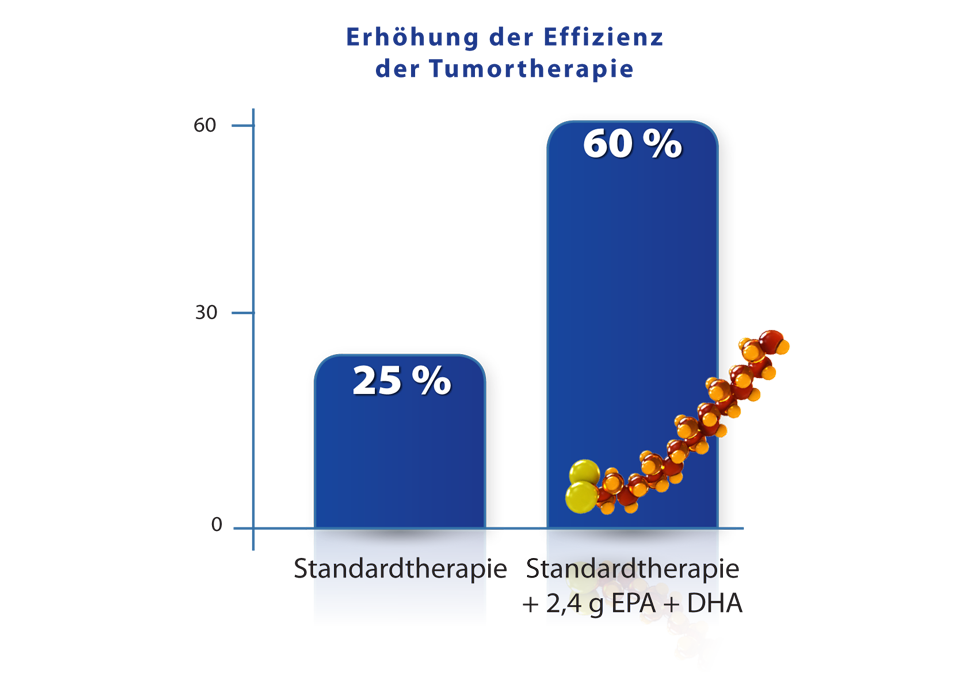
Breast cancer
The observations of 533,276 Norwegian women aged 35-54 years, which were conducted from 1970 to 1985, revealed that fishermen’s wives ran a 30% lower risk of breast cancer than the wives of unskilled workers. This study corroborates the hypothesis that certain aspects of diet, e.g. the consumption of fish, may be related to lower mortality due to breast cancer 13.
Another study demonstrated that a diet rich in fatty acids from marine sources (EPA and DHA) improves the prognoses of women diagnosed with breast cancer at an early stage. The 7-year-long observations demonstrated that women with a higher intake of EPA and DHA from food ran an approximately 25% lower risk of additional breast cancer events compared to women with the lowest intake. Women with higher intake of EPA and DHA from food were observed to experience, depending on the dose, reduction in the risk of all causes of mortality 14.
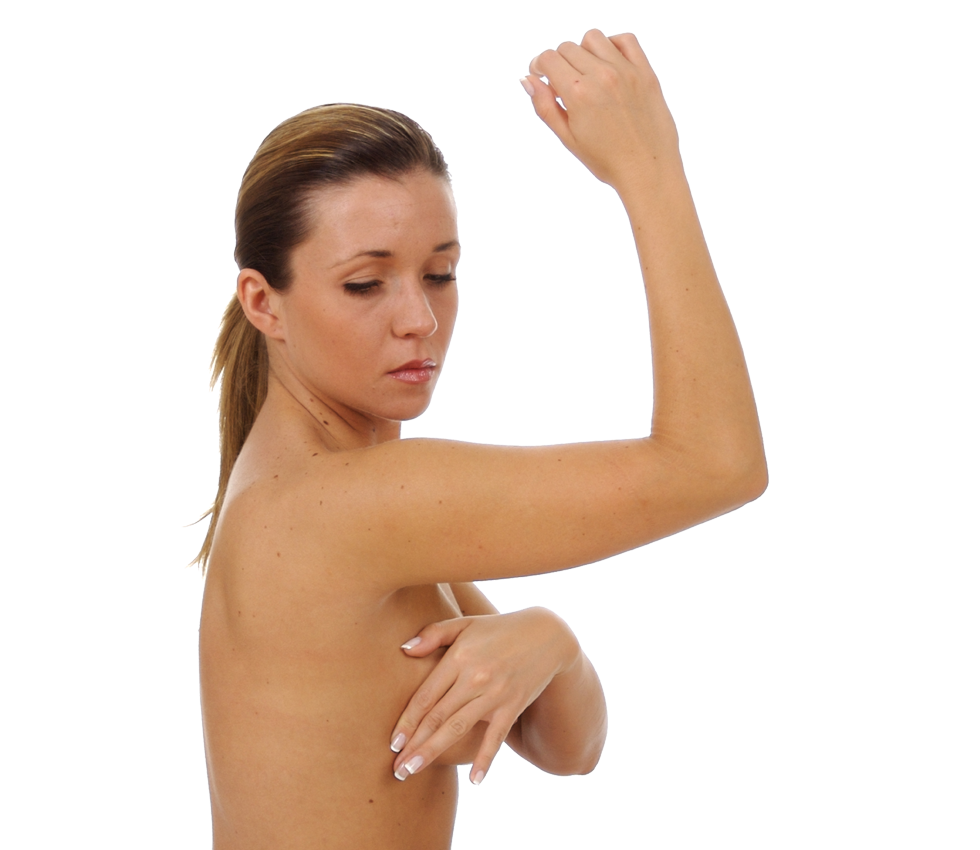
Prostate cancer
The study conducted at the Department of Urology of the Institute for Human Genetics at the University of California, San Francisco, in two study groups: men with prostate cancer and healthy individuals, revealed that consuming polyunsaturated fatty acids EPA + DHA omega-3 reduces the risk of developing prostate cancer.
Analyses have demonstrated that men who consumed at least 167 mg of EPA and 368 mg of DHA per day ran a 65% lower risk of prostate cancer than those who did not consume omega-3 acids at all. A 57% decrease in the risk was also revealed in the group of men consuming at least once a week such fish as salmon or mackerel, compared to men not eating fish at all 15.

Source of the effect
The effects arising out of using BioMarine®Medical are produced physiologically by the body. This means that they cannot be achieved in any other way. For their production, the body needs to activate concrete physiological processes that require relevant substances. And hence the resulting effects are so significant and multi-directional. This translates into significantly greater strength of the body as well as better effectiveness in saving patients’ life and health.
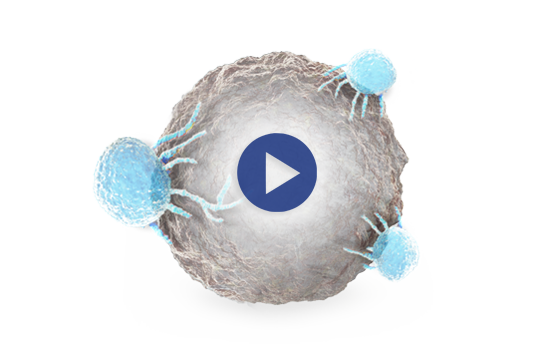
Effects of the system
Activation of the physiological immune processes leads to the death of neoplastic (cancer) cells.
Strong and efficient immune cells are the basis prerequisite for each therapy to be effective, especially in the case of the oncological therapy. A neoplasm (cancer) is a mutation of genes that transforms healthy cells into cancerous ones. The newly formed cell completely loses its properties, ceases to perform its functions, proliferates in an uncontrolled manner, becomes aggressive and destroys the surrounding healthy cells. The body tries to eliminate such cells. This process occurs via the immune system which includes specialised white blood cells, such as lymphocytes T, macrophages and NK cells.
If the immune system is strong and functions efficiently, it can effectively destroy the mutated cells at an early stage. As a consequence, the risk of cancer development is much lower. If the immunity is weakened, the risk of cancer progression increases significantly. The supply of physiological fats is necessary to increase the efficiency of an anti-cancer therapy on the one hand, and to protect the healthy cells against the negative consequences of such a therapy on the other.
OPINIONS Biomarine®
I use BioMarine® because I am suffering from cancer. I was severely affected by decreased immunity. The product I had used before failed to produce any positive effects, so 2 years ago I switched to BioMarine®. My immunity has increased – I am rarely ill and have not been on an antibiotic therapy for a few months now. The level of my cholesterol and triglycerides decreased, and this is the first time that my HDL and LDL are within normal range. In addition to that, my psoriasis has disappeared and the allergy has become less bothersome. I take the product for 4 months 3×2 caps., then a 2-month break and again. I will be taking BioMarine® as long as I live.
Grażyna Ż., aged 51, Kuźnia Raciborska


Dear specialist, in treating chronic diseases you need the help of experts in the genetic and physiological nutrition of the body.
The experts of the Science, Research and Development Department at MARINEX International are highly qualified specialists with many years of experience. They enjoy an enormous amount of trust amongst their clients, because they take care of their health every day. All this specialist knowledge can be obtained here absolutely for free.
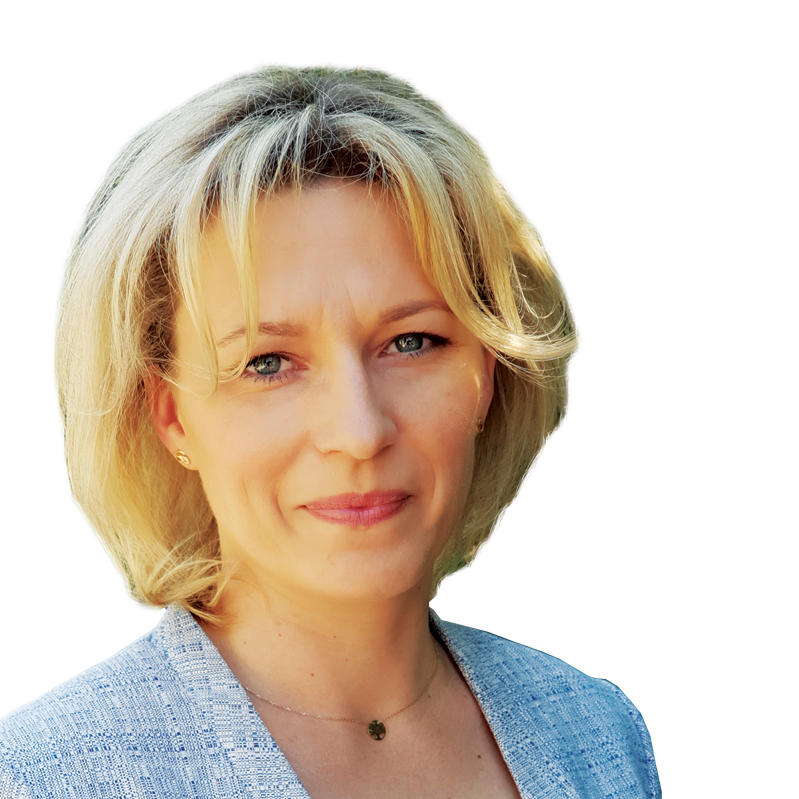
Physiologist,
dr n. biol. Joanna Zielińska – Tomaszewska
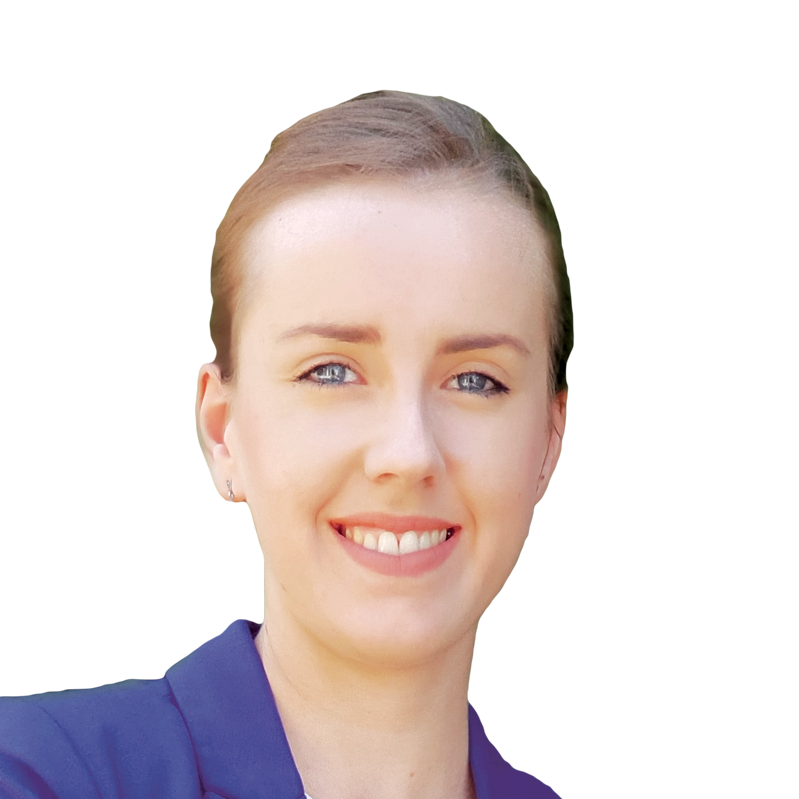
Pharmacist, environmental contamination diagnostician,
dr n. biol. Barbara Bukowska

Physiologist, licences dietician
mgr Konrad Tomaszewski
Please feel invited to book your consultations from Monday to Friday between 7:00 am and 2:30 pm.
Statistics
According to the Polish Central Statistical Office (GUS), there are as many as 150 thousand new cancer diagnoses per year, with as many as 100 thousand deaths. Most individuals die at the age of 50-80 years (74%), with 42.2% between the age of 50 and 70 years, while 31.8% between the age of 70 and 79 years.
After the age of 80 years, cancer mortality accounts for only 19% of cases. It is alarming that nearly 25% of deaths from cancer occur in individuals below the age of 60 years.
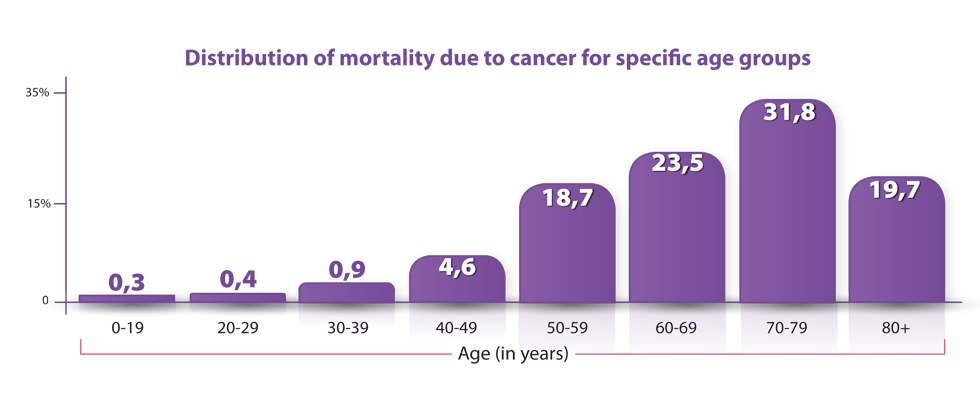
Statistics
According to the latest forecasts by the World Health Organization (WHO), it is estimated that the year 2030 will experience 75% more new cancer cases! By 2025, cancer incidence in Poland will increase by 40% 16. One of the main risk factors for cancers in Europe is poor diet and the related deficiencies of the physiologically essential substances used by the body for activating its defence mechanisms: signalling, immune, anti-inflammatory and antioxidant 17.
As revealed by the last 10 years of clinical and population studies, physiological nutrition offers the most effective protection for the body against the formation and development of cancers.
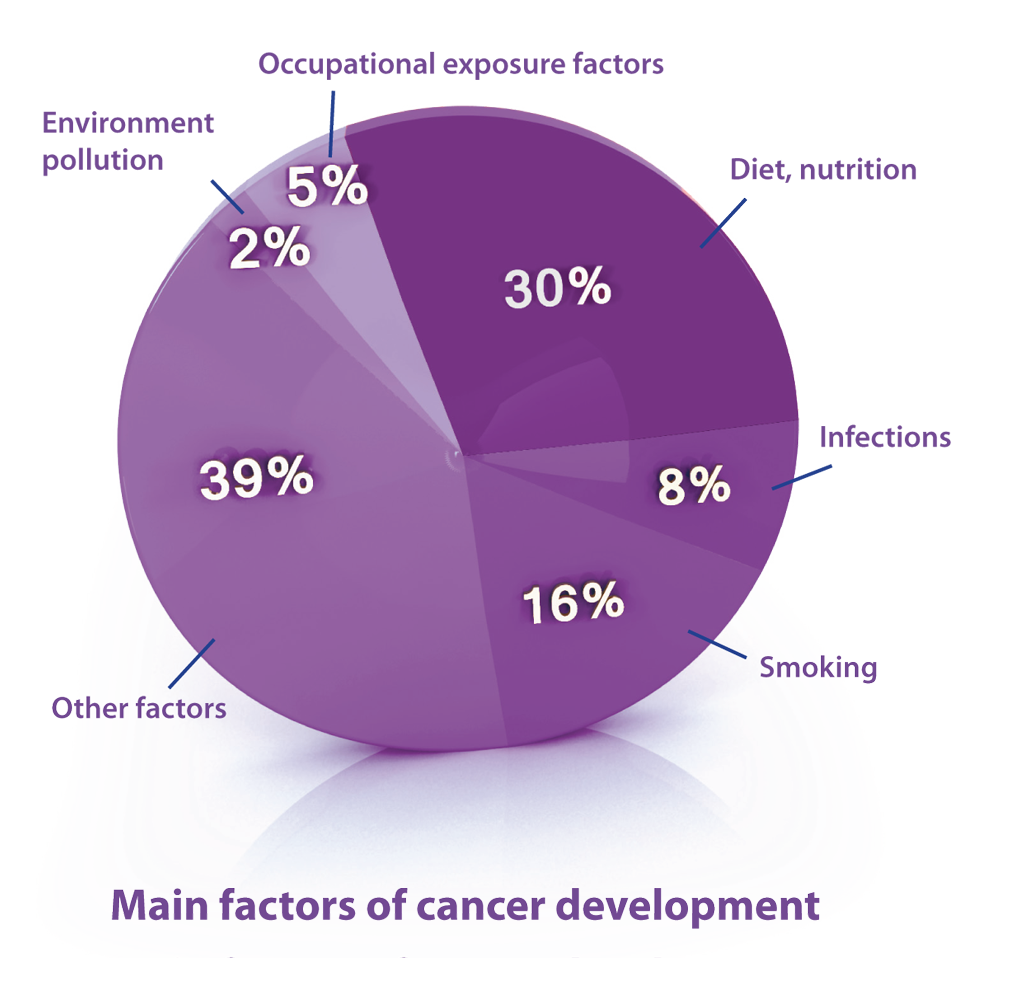
The facts are alarming. Change your habits and stop being part of these dramatic statistics:
- Cancer causes more than 8 million deaths in the world per year. It is nearly ¼ of our country’s population.
- The incidence rate is estimated to increase from 14 million in 2012 to 22 million in 2032.
- In Poland, there are about one million persons suffering from cancer
- Each year, our country loses a population like that of the city of Legnica due to oncological diseases.
- The economic costs related to cancer in Poland in 2015 amounted to 4.35 billion euro.
Polish National Cancer Registry, Department of Epidemiology and Cancer Prevention
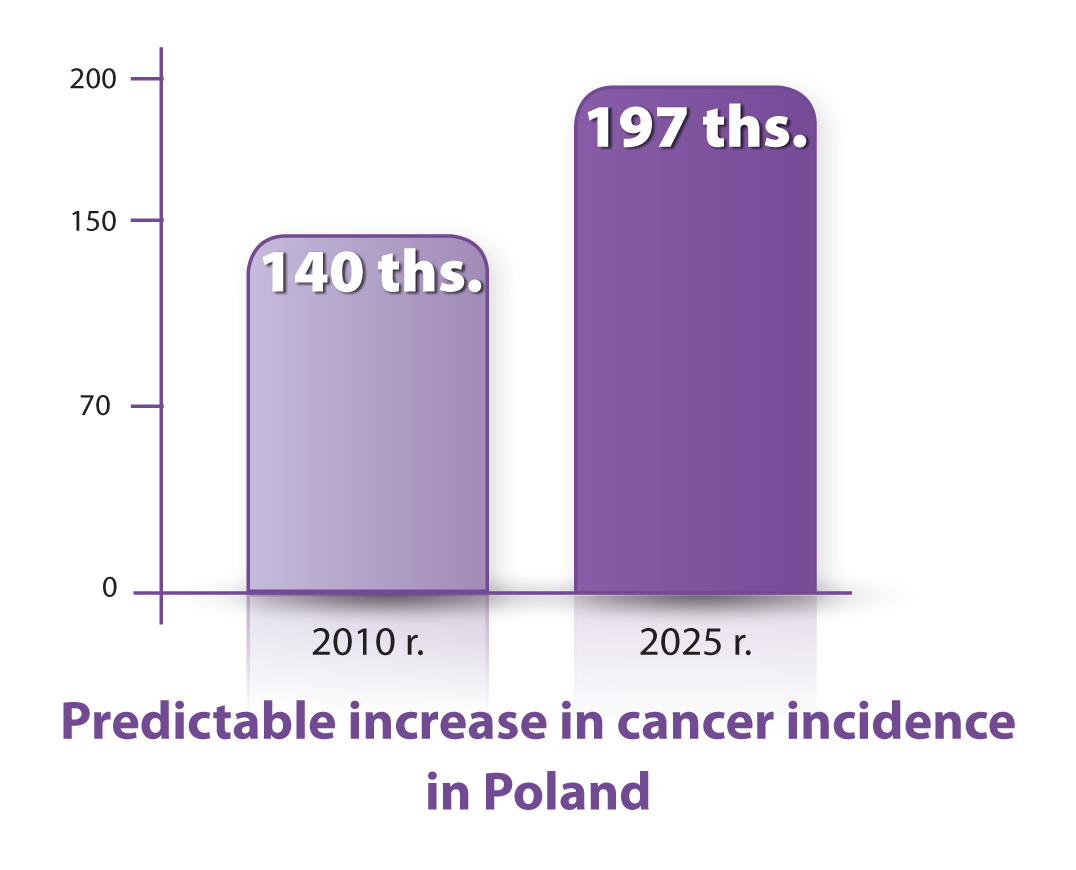
Literature
- Francuz T., Francuz-Czajka P., Cisoń-Jurek S., Wojnar J. Rola zapalenia w patogenezie raka jelita grubego. Postepy Hig Med Dosw, 2016, 70, 360-366.
- Aleszewicz-Baranowska J., Ereciński J. Powikłania kardiotoksyczne leczenia choroby nowotworowej u dzieci. Choroby Serca i Naczyń 2006, 3(3): 156–159.
- Brohult A., Brohult J., Brohult S., Joelsson I. Effect of Alkoxyglycerols on the Frequency of Injuries Following Radiation Therapy for Carcinoma of the Uterine Cervix. Acta Obstet Gynecol Scand,1977, 56: 441–448.
- Brohult A., Brohult J., Brohult S., Joelsson I. Effect of Alkoxyglycerols on the Frequency of Fistulas Following Radiation Therapy for Carcinoma of the Uterine Cervix. Acta Obstet Gynecol Scand, 1979, 58: 203–207.
- Lewkowicz P., Tchórzewski H. Wybrane aspekty działania przeciwnowotworowego 1-O-alkilogliceroli – głównej komponenty oleju z wątroby rekina. Pol Merk Lek, 2012, XXXIII, 198, 353-356.
- Kelly G.S. Squalene and its potential clinical uses. Altern Med Rev, 1999, 4(1): 29-36.
- Das B., Yeger H., Baruchel H., Freedman M.H., Koren G., Baruchel S. In vitro cytoprotective activity of squalene on a bone marrow versus neuroblastoma model of cisplatininduced toxicity: implications in cancer chemotherapy. Eur J Cancer, 39(17): 2556-2565.
- Murphy R.A., Mourtzakis M., Mazurak V.C. n-3 polyunsaturated fatty acids: the potential role for the supplementation in cancer. Curr Opin Clin Nutr Metab Care, 2012, 15(3): 246-251.
- Gerber M. Omega-3 fatty acids and cancers: a systematic update review of epidemiological studies. Br J Nutr, 2012, 107(Suppl 2): 228-239.
- Barbosa V.M., Miles E.A., Calhau C., Lafuente E., Calder P.C. Effects of a fish oil containing lipid emulsion on plasma phospholipid fatty acids, inflammatory markers, and clinical outcomes in septic patients: a randomized, controlled clinical trial. Crit Care, 2010, 14(1): R5.
- Wigmore S.J., Ross J.A., Falconer J.S., Plester C.E., Tisdale M.J., Carter D.C., Fearon K.C. The effect of polyunsaturated fatty acids on progress of cachexia in patients with pancreatic cancer. Nutrition, 1996, 12: 27-30.
- Chamras H., Ardashian A., Heber D., Glaspy J.A. Fatty acids modulation of MCF-7 human brest cancer cell proliferation, apoptosis and differentiation. J Nutr Biochem, 2002, 13(12): 711-716
- Lund E., Bonaa K.H.. Reduced breast cancer mortality among fishermen’s wives in Norway. Cancer Causes Control, 1993, 4(3): 283-287.
- Patterson R.E., Flatt S.W., Newman V.A., Natarajan L., Rock C.L., Thomson C.A., Caan B.J., Parker B.A., Pierce J.P. Marine fatty acid intake is associated with breast cancer prognosis. J Nutr, 2011, 141(2): 201-206.
- Fradet V., Cheng I., Casey G., Witte J.S. Dietary omega-3 fatty acids, cyclooxygenase-2 genetic variation, and aggressive prostate cancer risk. Clin Cancer Res, 2009, 15(7): 2559-2566.
- Bray F., Jemal A., Grey N., Ferlay J., Forman D. Global cancer transitions according to the Human Development Index (2008-2030): a population-based study. Lancet Oncol,2012, 13(8): 790-801.
- Cancer Atlas, 2006.
Zobacz także:
Infections
Coronary disease
Psoriasis
Rheumatoid Arthritis (RA)
Allergy
Schizophrenia
Studies
Dosage calculators


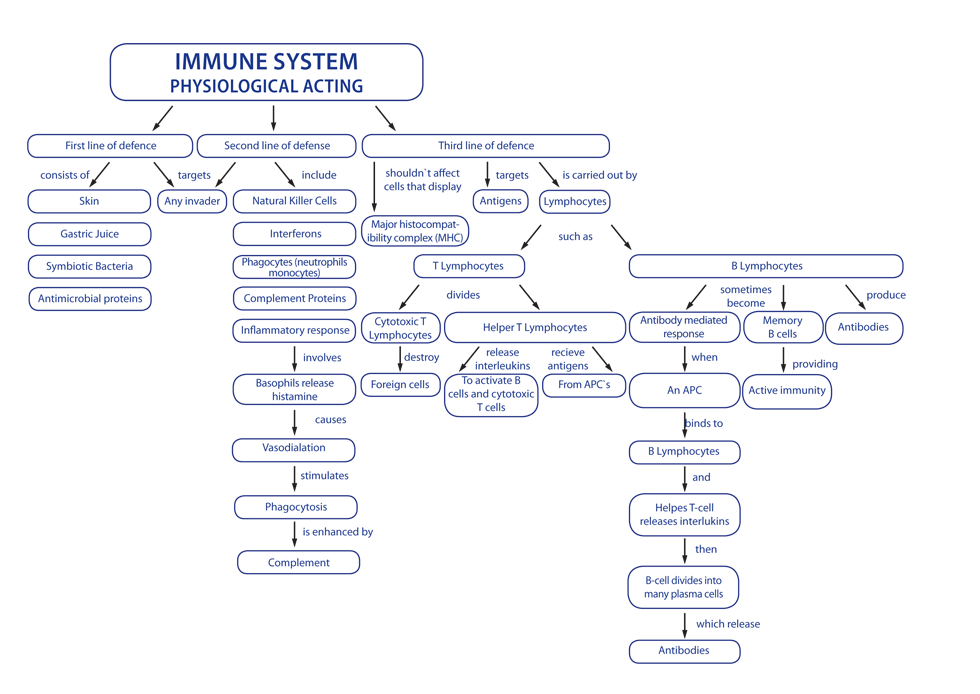
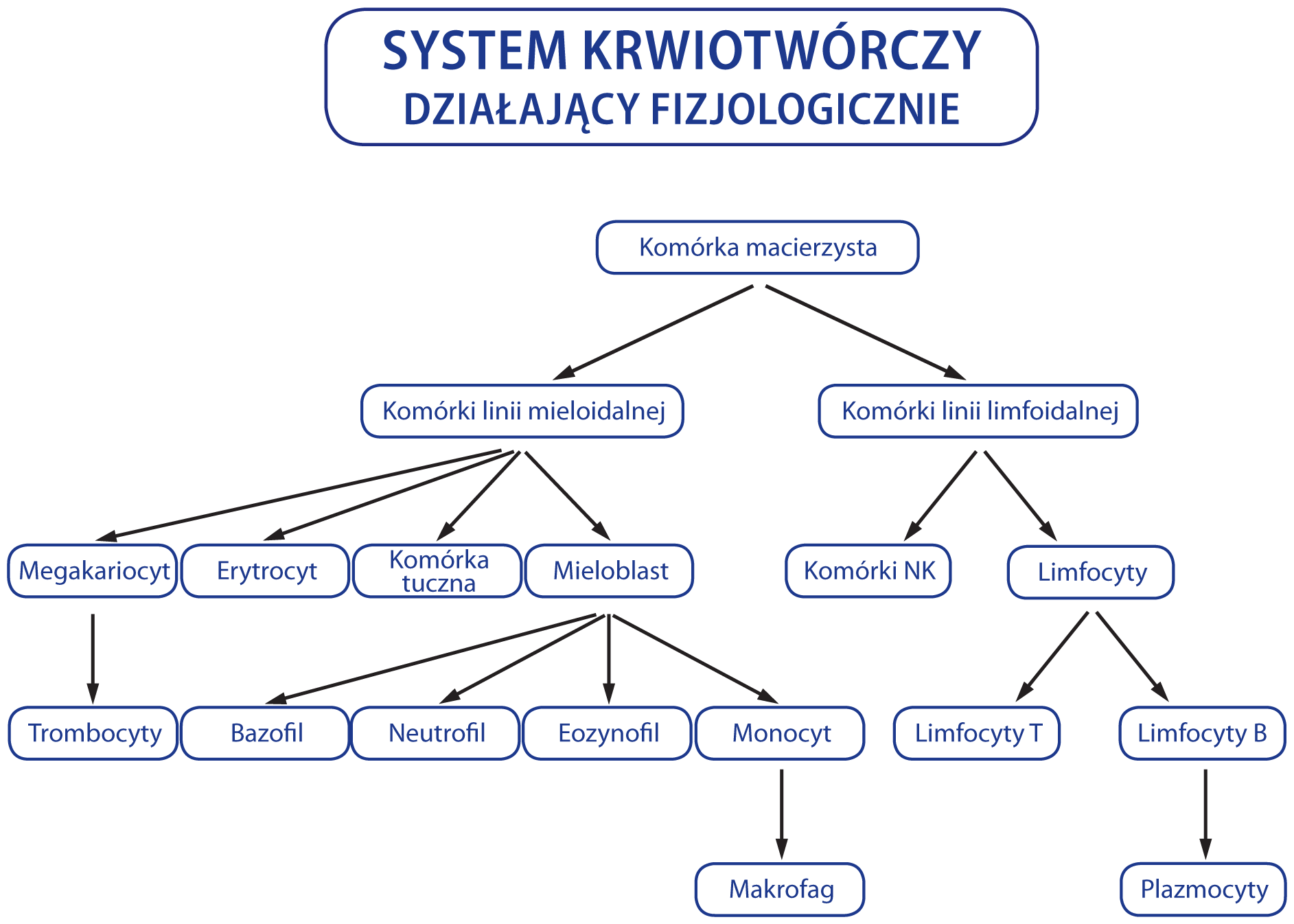
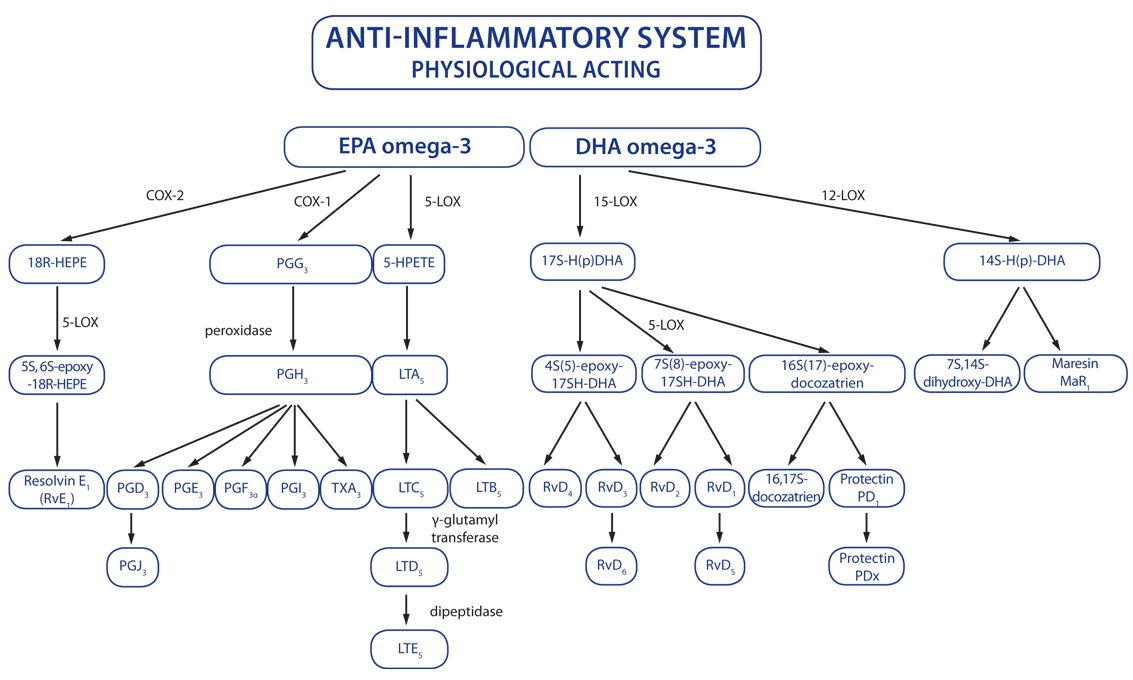
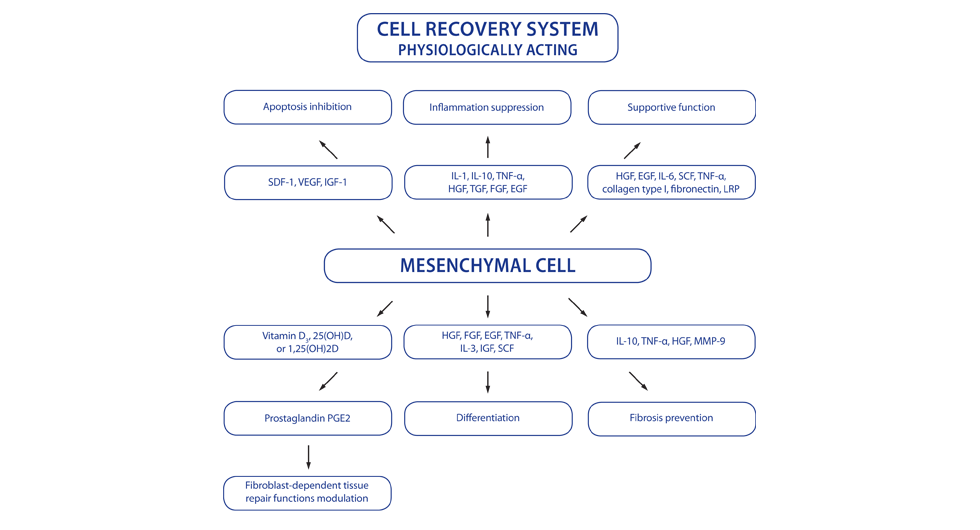
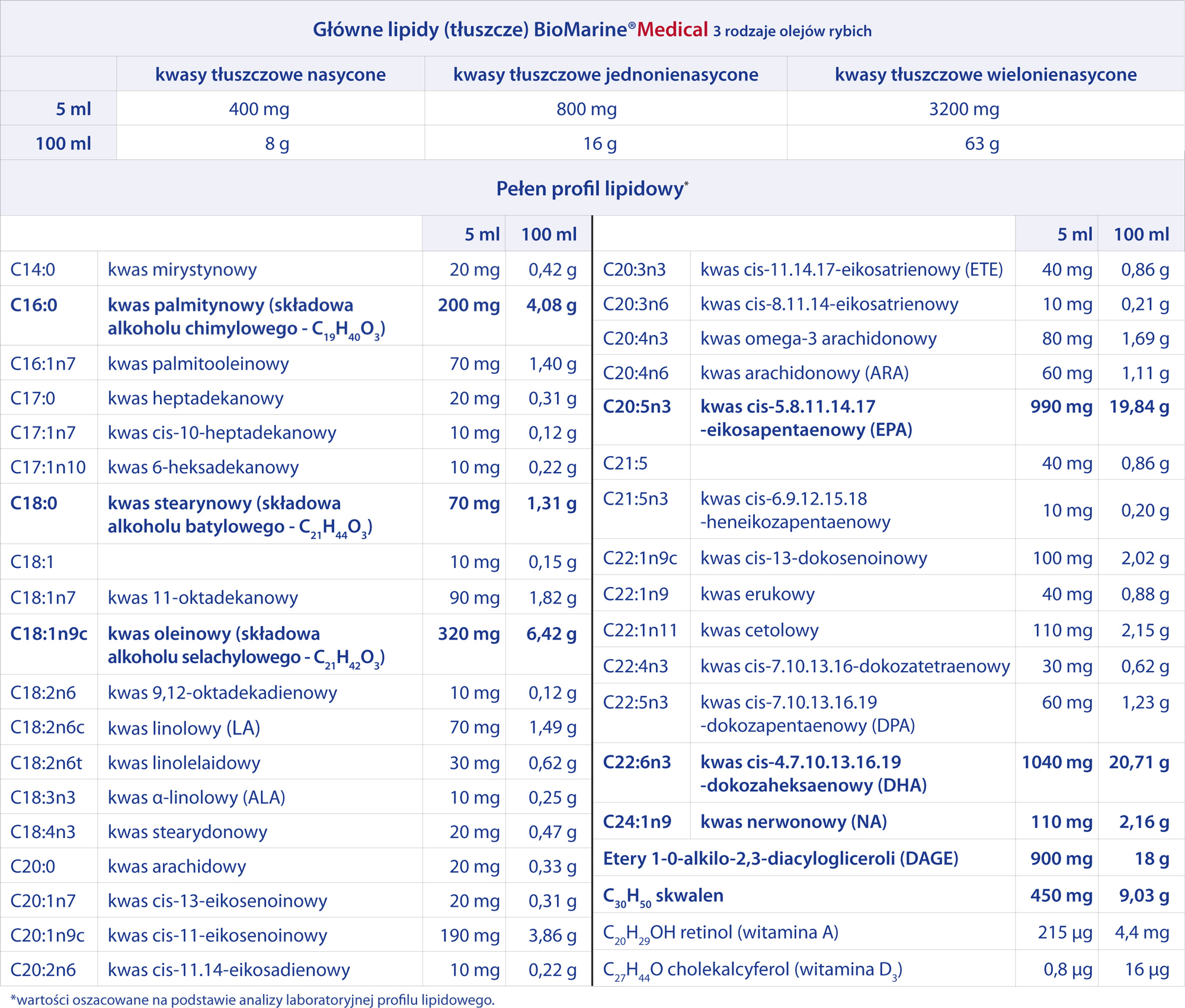

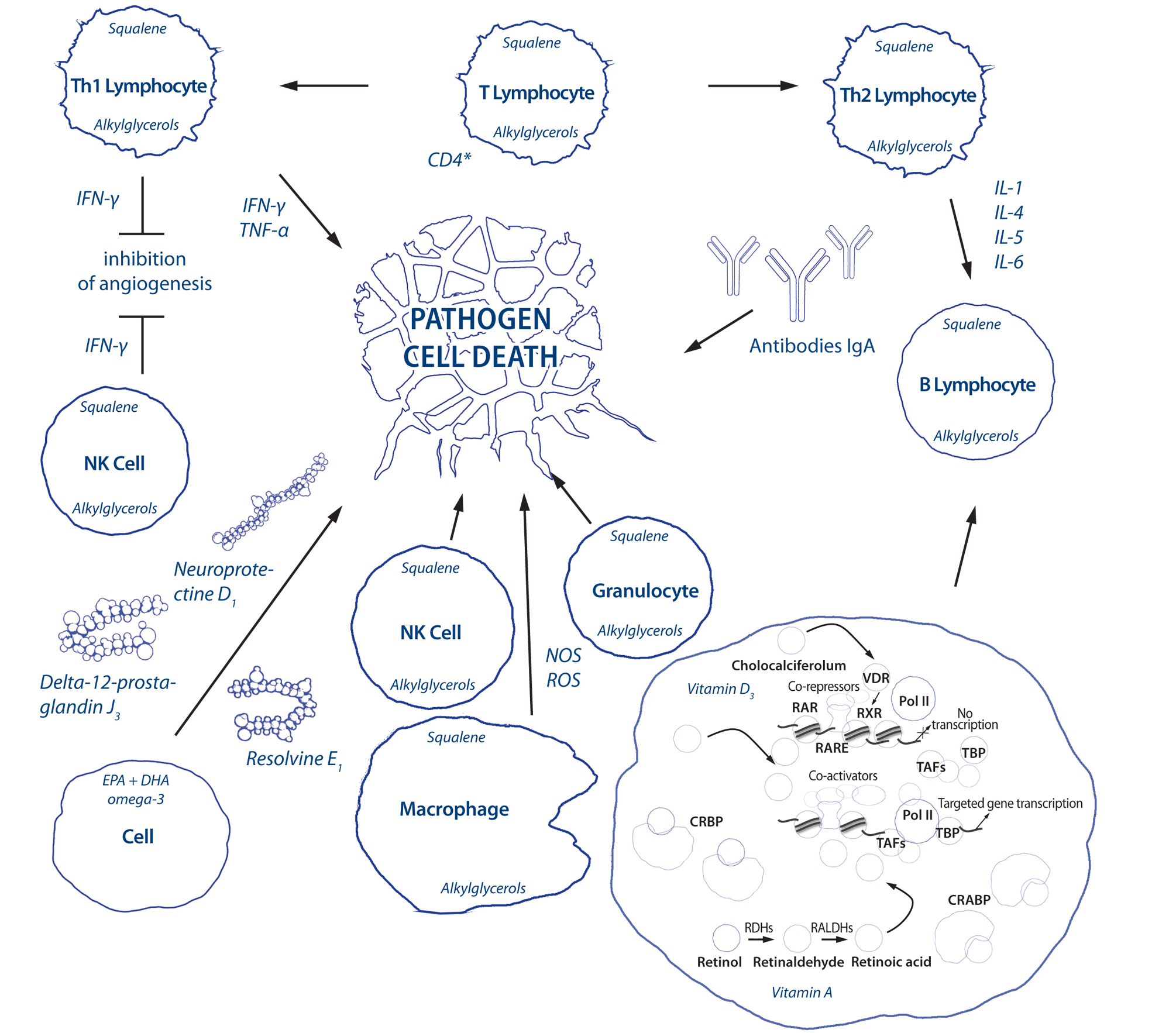
have been taking BioCardine®Omega-3 since 2008. I take 2-4 capsules per day. I suffer from arterial hypertension and, besides my dedicated drugs, I was advised by my cardiologist to take BioCardine®Omega-3. Ever since I started using this produce my immunity has increased and my fat levels in the blood are within normal range. Thanks to a diet from which I eliminated excessive fat I keep my body weight within normal range. I am 46 and in the summer time I regularly bike, while in the wintertime I use my stationary bike. I do not suffer from any cold. I am convinced that this is due to the improvement of my immunity arising out of my regular intake of BioCardine®Omega-3. I recommend this product to my acquaintances at my age so that they can avoid illness.
Andrzej R., aged: 46, Łódź